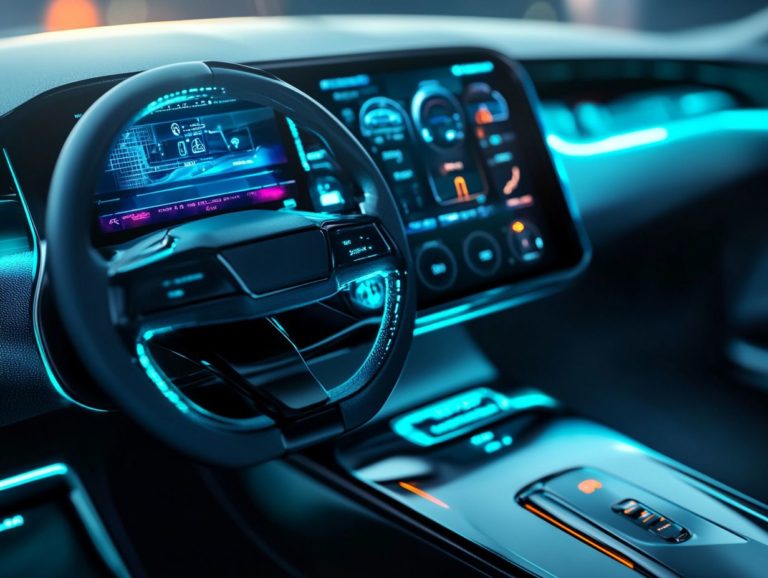Understanding the Impact of Ratings on Car Sales
In the fiercely competitive car industry, ratings are essential in shaping consumer choices and driving sales.
They influence everything from brand perception to purchasing decisions. This article delves into the factors that contribute to car ratings, examines their impact on sales, and outlines strategies manufacturers can implement to enhance their ratings.
The article will also show emerging trends and technologies poised to transform the landscape of automotive ratings. Get ready to discover how ratings can transform your car buying experience!
Contents
- Key Takeaways:
- The Importance of Ratings in the Car Industry
- Factors that Influence Ratings
- The Impact of Ratings on Car Sales
- Improving Ratings for Increased Sales
- The Future of Ratings in the Car Industry
- Frequently Asked Questions
- What role do ratings play in car sales?
- What types of ratings are important to consider when buying a car?
- How do safety ratings impact car sales?
- Do ratings impact a car’s resale value?
- How can understanding ratings help me make an informed car purchase?
- Are there downsides to relying on ratings when buying a car?
Key Takeaways:

- Ratings can greatly influence car sales due to their impact on consumer decisions and brand perception.
- Key factors such as safety, performance, and reliability contribute significantly to a car’s ratings and can impact its sales.
- Improving ratings through strategies such as addressing customer feedback and utilizing new technologies can lead to increased car sales in the future.
The Importance of Ratings in the Car Industry
Ratings hold significant sway in the car industry, guiding how dealerships showcase their vehicles and services to prospective buyers. They provide valuable insights into customer satisfaction and experiences, shaping the dealership’s overall reputation.
In a competitive market, positive ratings elevate brand value and cultivate trust and loyalty among customers. High ratings signal reliability and quality, while negative ratings can tarnish a dealership s reputation.
Recognizing the importance of these ratings is essential for both buyers and dealerships. Isn’t it crucial for you to feel valued at a dealership?
Why Ratings Matter for Car Sales
Ratings are vital for car sales as they directly shape buyer decisions and elevate dealership credibility. High ratings reflect customer satisfaction and foster trust in potential buyers.
A dealership that proudly showcases a high average rating sends a clear message of reliability and quality, encouraging buyers to explore their inventory. Positive customer reviews enhance a dealership’s image and act as compelling endorsements that draw in new clients.
For example, utilizing feedback mechanisms like surveys can be incredibly beneficial. Dealerships often use these tools to gather insights into customer experiences, ensuring they promptly address any issues. This proactive strategy leads to continuous improvement, cultivating customer loyalty and driving sales upward.
Factors that Influence Ratings
Several factors influence ratings in the car industry. They encompass customer service, sales processes, communication, and training practices within dealerships.
As a buyer, your overall experience matters immensely. You ll weigh aspects like responsiveness, trustworthiness, and the quality of the vehicle you purchase. The training of dealership staff sets the tone for your expectations and satisfaction levels.
If you aim for high ratings, it s essential to maintain a consistent focus on enhancing these critical elements.
Key Elements that Affect Ratings

Key elements that influence ratings include customer satisfaction, quality of service, and effective communication throughout the sales process. These factors intricately interplay, significantly shaping your perception of the dealership.
When a dealership prioritizes customer satisfaction, it often cultivates a loyal clientele that returns for future purchases and refers friends and family.
Quality service manifests through timely vehicle maintenance and repairs, ensuring you feel valued and cared for. Transparent communication regarding financing options or vehicle features builds trust.
A dealership that addresses your concerns openly and provides clear information is more likely to receive positive feedback, enhancing its ratings in reviews and consumer reports. Ultimately, these elements create a harmonious environment that attracts both new and repeat business.
Check your dealer’s ratings today and make an informed choice!
The Impact of Ratings on Car Sales
The impact of ratings on car sales is very important. Ratings significantly influence consumer decisions and shape perceptions of dealership brands.
Positive ratings enhance a dealership’s reputation and foster customer loyalty, leading to repeat business and valuable referrals. In contrast, negative ratings can deter potential buyers, hurting sales performance and overall market standing.
By understanding how ratings affect consumer behavior, you can tailor your marketing efforts to connect more effectively with your audience.
How Ratings Affect Consumer Decisions
Ratings greatly influence your decisions during the car-buying process. They serve as a vital source of trust and reliability for potential buyers like you.
When considering a vehicle purchase, it’s natural to seek out ratings and reviews to understand others’ experiences. This need for reassurance drives you to seek reviews.
Your emotional responses shape your perceptions of quality and value. A product with great reviews builds more trust, leading to increased sales and a willingness to consider higher-priced options.
This illustrates the strong impact that shared experiences can have on your buying behavior.
The Role of Ratings in Brand Perception
Ratings are crucial in shaping your brand perception in the car industry. They directly influence how customers view your dealership and offerings.
When prospective buyers explore online reviews, they rely heavily on ratings to guide their decisions. This underscores the importance of maintaining a positive reputation.
Take brands like Toyota and Tesla, for example. They consistently use high customer ratings to showcase their reliability and innovation.
Toyota’s commitment to quality has built customer loyalty, leading to repeat purchases an essential ingredient for long-term success.
Meanwhile, Tesla s ability to maintain high ratings across various platforms has strengthened its market position and created a devoted community of supporters who advocate for the brand based on their outstanding experiences.
By prioritizing customer satisfaction and actively managing feedback, these brands demonstrate how ratings can significantly impact both reputation and sales.
Improving Ratings for Increased Sales

Enhancing your ratings is essential if you’re a dealership aiming to boost sales. High ratings attract more customers and improve your overall market reputation.
Strategies for Improving Ratings
Effective strategies for enhancing ratings focus on improving customer service and actively seeking feedback to refine your dealership processes.
One effective approach is to conduct regular customer satisfaction surveys. These surveys ask customers how happy they are with your service and help you identify areas for improvement.
Responding promptly to reviews whether positive or negative shows your commitment to customer engagement and builds trust. Ongoing staff training is crucial, ensuring employees are well-equipped to meet diverse customer needs.
For example, a dealership in California created a feedback loop from their surveys that highlighted service delays. By addressing these concerns, they boosted customer satisfaction and saw a significant rise in their ratings, showcasing a remarkable transformation driven by actionable insights.
The Future of Ratings in the Car Industry
The future of ratings in the car industry is bright, driven by new trends and technologies that enhance customer engagement and feedback mechanisms.
Start improving your ratings today and watch your sales soar!
New Trends and Technologies
New trends and technologies are transforming how ratings are collected and used in the car industry.
Online review platforms empower you to share your experiences. These insights help dealerships enhance their services.
Social media acts as a game-changer by amplifying reviews. This offers potential buyers a genuine look at a dealership’s reputation.
With data analysis tools, dealerships can go through a lot of customer reviews. They identify trends that help make better choices.
Integrating these technologies helps dealerships build customer engagement. This can lead to improved satisfaction and loyalty.
Frequently Asked Questions

What role do ratings play in car sales?
Ratings are vital in car sales as they provide an objective measure of performance and safety. They can heavily influence a buyer’s decision.
What types of ratings are important to consider when buying a car?
Important ratings to consider include safety, reliability, and performance ratings. Fuel efficiency and customer satisfaction ratings also matter.
How do safety ratings impact car sales?
Safety ratings greatly influence a consumer’s perception of a car. Higher ratings can boost popularity and market demand.
Do ratings impact a car’s resale value?
Yes, higher ratings usually mean a car holds its value better in the used market. Buyers see them as more reliable and sought after.
How can understanding ratings help me make an informed car purchase?
Understanding ratings gives you insights into a car s performance and safety. They also indicate how well a car may keep its value.
Are there downsides to relying on ratings when buying a car?
While ratings are helpful, they shouldn’t be the only consideration. It’s crucial to think about your budget, lifestyle, and personal needs.
If you have more questions, don’t hesitate to ask!





